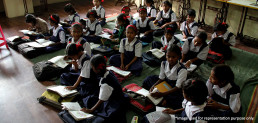Early childhood education in India focuses on the formative years from birth to age 6, laying the foundation for lifelong learning and development. Despite this, many children still lack access to quality early education due to various challenges.
However, growing awareness and government initiatives are pushing for greater focus on this vital phase of education. Keep reading to know more about the importance of early childhood education.
What Is Early Childhood Education and Why Is It Important?
Early childhood education refers to educational programs and practices for children from birth to age eight. It encompasses activities and experiences that promote young children’s physical, emotional, social, and cognitive development, preparing them for future learning and success.
Importance of Early Childhood Education
Some reasons why educating children early is important are:
- Early education provides a strong foundation for academic and personal growth throughout life.
- It helps level the playing field for children from diverse backgrounds, giving them access to quality education.
- It addresses disparities in learning, helping children start school with the skills they need to succeed.
- It supports children’s mental and physical health by fostering a nurturing and stimulating environment.
- Investing in early education leads to long-term benefits, including higher productivity and reduced social costs.
Key Benefits of Early Education for Children
Early education offers numerous benefits that lay the foundation for a child’s future success. These include:
- Cognitive development: Early education stimulates brain development, improving problem-solving and critical-thinking skills.
- Social skills: Children learn to interact with peers, share, and communicate, which builds strong social foundations.
- Emotional growth helps children manage emotions, build resilience, and gain self-confidence.
- Academic readiness: Early education prepares children for academic success by developing basic literacy and numeracy skills.
- Improved long-term outcomes: Children who attend early childhood education are more likely to graduate and succeed in their careers.
The Importance of Early Childhood Education in Shaping Future Learning
Investing in early education has long-term benefits. Research shows that children attending quality early childhood programs are more likely to perform better academically, have higher graduation rates, and experience greater career success. This early investment is important in narrowing the achievement gap, particularly for children from disadvantaged backgrounds.
Challenges Faced by Early Education in India
Several challenges hinder the progress and effectiveness of early childhood education in India. These obstacles impact the quality and reach of early education, affecting children’s development at crucial stages.
- Lack of awareness about the importance of early childhood education limits its support from parents and communities. Many still see early education as optional rather than foundational for a child’s growth.
- There is a shortage of trained educators, which affects the quality of teaching. Many teachers lack the necessary skills to provide effective early education, leading to gaps in children’s learning.
- Access to quality early childhood education is limited, especially in rural areas. Children from disadvantaged backgrounds face barriers such as distance, affordability, and inadequate facilities.
- Inadequate government support and funding often leave early education programs under-resourced. This lack of investment means fewer children can benefit from quality programs that promote their overall development.
- Social and cultural barriers also play a role, as some communities prioritize traditional education over modern early education approaches.
How Parents Can Play a Role in Early Education
Parents can significantly impact their learning journey by actively participating in their child’s early development. Here’s how:
- Encourage learning at home by engaging your child in simple activities like reading together and counting objects. This helps build their cognitive and language skills, vital in early education.
- Create a positive learning environment by offering your child a safe and supportive space to explore.
- Provide opportunities for social interaction by arranging playdates or encouraging participation in group activities.
- Talk to your child about their day and ask open-ended questions. This encourages communication skills and strengthens their ability to think critically.
- Support your child’s education by staying informed about the importance of early childhood education and actively participating in their school activities or programs.
Steps Taken by Cry America to Promote Early Childhood Education
CRY America has taken several significant steps to promote early childhood education in underserved communities, ensuring children receive the foundation they need for a successful future.
One of our core efforts is strengthening early education programs, such as Anganwadis and primary schools, to ensure that children aged 0 to 6 are enrolled and receive the proper care and attention. CRY America works to improve infrastructure, ensure the availability of trained educators, and create child-friendly learning environments that foster growth and development.
Another key action is their focus on building community awareness about the importance of early childhood education, helping families understand its long-term impact on a child’s success. We also work with local governments and NGOs to provide the necessary resources, such as educational materials and school readiness programs, to bridge gaps in access to early education.
FAQs
What are the challenges of early childhood education in India?
One of India’s main challenges is the lack of infrastructure and resources, especially in rural areas, which hinders access to quality early childhood education. Additionally, there is a shortage of trained teachers and inconsistent implementation of early education programs, making it difficult to ensure uniform standards across the country.
How does early childhood education shape a child’s future?
Early childhood education is critical in shaping a child’s cognitive, social, and emotional development. It helps children build a strong foundation for learning, improves their academic performance later in life, and equips them with essential skills that impact their overall success in school and beyond.
What steps has India taken to promote early education?
India has introduced initiatives to promote early childhood education, such as the Integrated Child Development Services (ICDS) and the Right to Education (RTE) Act. The government is also focusing on improving the quality of preschool education by training teachers and upgrading the infrastructure of Anganwadis and other early education centers.
How can parents contribute to early childhood education at home?
Parents can contribute by engaging with their children in activities that stimulate learning, such as reading, playing educational games, and encouraging curiosity. Creating a positive, supportive environment at home can reinforce the importance of early childhood education and help children develop essential skills for future learning.
Recommended for you


















































